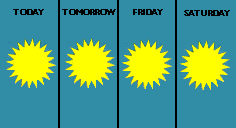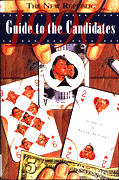Bob Dole was making his way through a small crowd in Lyndhurst, New Jersey, when a man called out, “Please get Bozo out of the White House.” Dole jokingly responded, “Bozo’s on his way out,” and went on to address the crowd as scheduled. The next day’s headlines almost screamed for joy: “Dole Calls Clinton ‘Bozo.'” Like Arizona weathermen hearing news of a monsoon, the reporters covering the campaign trail gleefully pounced on the offhand remark.
 With Clinton leading by a large margin, the press has had so little to report that it’s resorted to desperate measures: blowing minor statements out of proportion, and, when all else fails, talking about itself. The coverage of the campaign has almost begun to eclipse the election itself. One of the biggest stories at the Republican convention, for example, was Ted Koppel’s frustrated departure.
With Clinton leading by a large margin, the press has had so little to report that it’s resorted to desperate measures: blowing minor statements out of proportion, and, when all else fails, talking about itself. The coverage of the campaign has almost begun to eclipse the election itself. One of the biggest stories at the Republican convention, for example, was Ted Koppel’s frustrated departure.
So much for the days when primaries, conventions, debates, and campaign stops could influence an election’s outcome. These events are so pre-programmed that daily coverage is redundant and often meaningless. Yet the media continues to hunt for “breaking news,” conjuring it out of non-events when necessary. Web sites that emphasize their round-the-clock updates are only engaging in technological posturing, flooding the public with information simply because they can.
Those seeking a more thoughtful approach to the elections will be disappointed by this season’s literary offerings. The hottest books, like Primary Colors (Anonymous (Joe Klein), Random House) and the now-discredited Unlimited Access (Gary Aldrich, Regnery Publishing, Inc.), revel in innuendo. The neighboring shelves are stacked with those that, like the Doles’ Unlimited Partners (Simon & Schuster) or Clinton’s Between Hope and History (Times Books), shamelessly engage in partisan cheerleading. Analysis is relegated to the daunting tomes put out by public interest groups and academics, loaded down with footnotes and number-crunching. [One notable exception is The Buying of the President (Avon Books) by Charles Lewis of the Center for Public Integrity].
 We can disdain the lack of accessible, insightful coverage all we like, but the quadrennial collision between politics and the media keeps us looking over our shoulders to stare at the wreckage left in their wake. Digging through this rubble does, however, reward the political junkie with a mild fix or two. The New Republic Guide to the Candidates, 1996 (BasicBooks) creates — with no small amount of self-congratulation — a context with which to sift through the flow of “news.” This compilation of articles (dating back to 1984) reveals the history each candidate has established for themselves, helping to ground a campaign season in which Clinton, Dole, and Kemp have all performed 180s on previous, long-held stances. The Atlantic Monthly‘s Election Connection ’96 takes a similar tack with issues like abortion, religion, and the budget; allowing for a fuller, more measured discourse beyond the current volatile soundbites. When more publications have further-reaching archives online, this kind of historical perspective — from more than just a singular source — could be only a click away.
We can disdain the lack of accessible, insightful coverage all we like, but the quadrennial collision between politics and the media keeps us looking over our shoulders to stare at the wreckage left in their wake. Digging through this rubble does, however, reward the political junkie with a mild fix or two. The New Republic Guide to the Candidates, 1996 (BasicBooks) creates — with no small amount of self-congratulation — a context with which to sift through the flow of “news.” This compilation of articles (dating back to 1984) reveals the history each candidate has established for themselves, helping to ground a campaign season in which Clinton, Dole, and Kemp have all performed 180s on previous, long-held stances. The Atlantic Monthly‘s Election Connection ’96 takes a similar tack with issues like abortion, religion, and the budget; allowing for a fuller, more measured discourse beyond the current volatile soundbites. When more publications have further-reaching archives online, this kind of historical perspective — from more than just a singular source — could be only a click away.
A different kind of filter through which to view the presidential contest is found in the two-part Esquire cover story, “The Best Man” (September 1996), written by Taylor Branch (author of Parting the Waters: America in the King Years) and Richard Ben Cramer (author of What it Takes). Branch, who once shared an apartment with a young Bill and Hillary, writes an admiring, yet wary profile of Clinton. Though much of the piece is deeply personal in its reflections, Branch uses his insider’s knowledge to present scathing rebuttals to some of the most commonly held charges against Clinton: his lack of conviction, and the frenzied fixation on Whitewater. Cramer’s portrait of Dole reveals more about the political process — the reasons a potential candidate gets drawn in, the things the public looks for in him, the kind of story he needs to tell to succeed — than about Dole’s personal life or convictions. Perhaps Dole has been a politician for so long that the two are inextricable.
Writers like Branch and Cramer prove that feature journalism doesn’t have to be soft; it doesn’t have to play the understudy to “real news.” “ The Choice ’96,” the latest installment of PBS’s acclaimed “dual biography” of the candidates, is a hit-and-miss attempt at legitimizing the profile. A quirky segment in which a caricature artist describes the candidates’ faces and the sense that he tries to convey with his drawings is followed by a vivid portrait of their (literal) “landscapes.” The camera pans slowly over hard, silent Russell, Kansas — the sparse landscape that dreamers passed through on their way West — and soars over lively, contradictory, almost garish Hot Springs, Arkansas. The psychological profiles created through examining their time in history, their mentors, their religion, and their failures serve less to change, than to explain the public’s view of the candidates. The near-total neglect of defining issues is justified, say the filmmakers, because both candidates are men who share an “agendaless,” nonideological approach to politics, where expediency often takes precedent over their core values.
PoliticsNow’s “ Parallel Lives” purports to be the viewer’s “chance to explore the lives of Bill Clinton and Bob Dole in an entirely new way,” but in the end takes a “This is Your Life” approach, complete with baby photos and video clips. Its “interactive” timeline is mainly good for a few laughs at Clinton’s 70s hairstyles and juxtapositions that drive home the age difference: when Clinton was born, Dole had already returned from WWII. This is played up further in the “Generation Gap,” which compares the popular culture prevalent at important stages in Bob and Bill’s lives. “Time Capsule” details the numerous comebacks of both candidates, lending some urgency to these profiles of two men whose self-worth hinges on a successful career in public office.
The San Francisco Chronicle takes a different approach with its profiles (June 16-22, 1996; Kenneth J. Garcia) of cities that epitomize election issues — such as racial divisions, religion, and corporate downsizing. Instead of asking how Clinton’s signing of the welfare reform bill will affect his campaign, these articles explore the impact this decision will have on a family that depends on the entitlement checks. The series brought to life a crime-ridden project in New Orleans, or a burnt-out church in Alabama, but failed to point a finger at the political decisions and figures that shaped them. The sketches appealed to readers’ emotions, yet offered no suggestion of how their choice for president might determine the fate of these regions.
The perspectives of “ordinary Americans” across the country are also highlighted by the Web site Publius. This mostly one-man show suffers from a surplus of ambition: the reports and postings haven’t been updated since the end of August; the promised “live events” haven’t materialized. Some stories also dwell too long on the journalist’s mundane experiences and existential soul-searching as he travels from state to state. But the interviews with onlookers at the Democratic convention are refreshingly candid. Hopefully more reporters will pick up on this concept and fulfill the promise Publius shows when the reporter comes face-to-face with the contrast between the luxury of the convention and the poverty right outside its doors. “All those people upstairs think they’re saving the world,” his homeless guide says, “If they really wanted to say something, they would have had the damn convention outside.”
It’s not just the politicians that need to step outside; new technologies need a new paradigm for reporting (and making) political news. The old methods are becoming outdated fast: this campaign offers no surprises in the polls, no passionate issues being debated at the podiums. Just what is there to report when both major candidates oppose same-sex marriage, support reducing legal immigration, vaguely call AIDS research “a priority,” support NAFTA, and claim to be tough on crime? But the journalists who dug deeper — to reveal the men behind the politicans’ masks or the issues consuming the public — haven’t taken the easy way out. Their work shows the potential of innovative, in-depth coverage of candidates, issues, and voters to bring focus and differentiation to this kind of centrist campaign. There’s more to do than bemoan the lack of news, watch the skies, and concoct the latest gimmick to attract — but eventually frustrate — readers and viewers. While all eyes are on the media, it can make some news of its own by changing the way it does business.

















